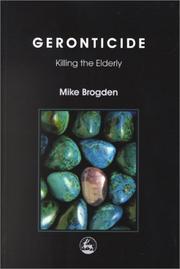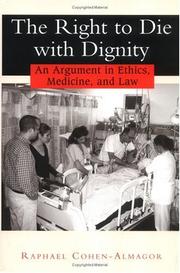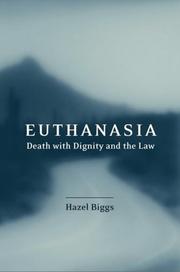| Listing 1 - 10 of 17 | << page >> |
Sort by
|
Book
ISBN: 1135957681 113595769X 0585451737 0203902556 1280355093 Year: 2001 Publisher: New York : Routledge,
Abstract | Keywords | Export | Availability | Bookmark
 Loading...
Loading...Choose an application
- Reference Manager
- EndNote
- RefWorks (Direct export to RefWorks)
Dying Right provides an overview of the Death With Dignity movement, a history of how and why Oregon legalized physician-assisted suicide, and an analysis of the future of physician-assisted suicide. Engaging the question of how to balance a patient's sense about the right way to die, a physician's role as a healer, and the state's interest in preventing killing, Dying Right captures the ethical, legal, moral, and medical complexities involved in this ongoing debate.
Right to die --- Assisted suicide --- Euthanasia --- Law and legislation
Book
ISBN: 2911416449 Year: 2001 Publisher: Paris : Imago,
Abstract | Keywords | Export | Availability | Bookmark
 Loading...
Loading...Choose an application
- Reference Manager
- EndNote
- RefWorks (Direct export to RefWorks)
Old age --- Right to die --- Old age homes --- Vieillesse --- Droit à la mort --- Foyers pour personnes âgées --- 179.7 --- 612.67

ISBN: 2213610983 9782213610986 Year: 2001 Publisher: Paris : Fayard,
Abstract | Keywords | Export | Availability | Bookmark
 Loading...
Loading...Choose an application
- Reference Manager
- EndNote
- RefWorks (Direct export to RefWorks)
La médecine moderne nous fait vivre plus longtemps, elle doit aussi nous permettre de mourir plus dignement, de quitter ce monde paisiblement et sans souffrances, de déterminer, si nous le souhaitons, le moment et les conditions de notre mort. Pourtant cette dernière liberté n'est toujours pas reconnue, et bien des vérités sur la façon dont nous finissons notre vie restent obstinément cachées. Dans ce livre, François de Closets nous révèle d'abord que la mort volontaire, interdite par la loi, est une pratique médicale courante. Elle concerne au moins le tiers des décès en France. Actes illégaux, toujours clandestins, effectués dans les pires conditions. Pour les médecins comme pour les patients. L'interdit a en outre créé la mort à deux vitesses. D'un côté, ceux qui disposent de relations et bénéficient, s'ils le désirent, d'une fin douce et médicalisée. De l'autre, les malades ordinaires, soumis à l'arbitraire médical, qui se voient refuser l'ultime délivrance ou bien, au contraire, imposer la mort à leur insu. Que faire ? La loi n'a pas à trancher le débat " pour ou contre l'euthanasie ", car il s'agit d'un choix personnel et qui doit le rester. Elle doit seulement permettre à chacun, ceux qui refusent l'euthanasie comme ceux qui la demandent, d'exercer sa dernière liberté. François de Closets s'appuie sur des témoignages bouleversants, des preuves irréfutables, des vérités occultées pour apporter des réponses qui nous concernent tous.
Right to die --- Euthanasia --- Assisted suicide --- Moral and ethical aspects. --- 179.7 --- Euthanasie --- euthanasie --- Frankrijk --- Eerbied voor het menselijk leven. Moord. Zelfmoord. Euthanasie. Foltering --- France --- 179.7 Eerbied voor het menselijk leven. Moord. Zelfmoord. Euthanasie. Foltering --- Moral and ethical aspects --- Right to die - Moral and ethical aspects. --- Euthanasia - Moral and ethical aspects. --- Assisted suicide - Moral and ethical aspects.
Book
ISBN: 1281806226 9786611806224 0826116612 9780826116611 Year: 2001 Publisher: New York : Springer Pub. Co.,
Abstract | Keywords | Export | Availability | Bookmark
 Loading...
Loading...Choose an application
- Reference Manager
- EndNote
- RefWorks (Direct export to RefWorks)
The study of ""the end of life"" has become a major focus on medicine, the social sciences, ethics, and religion. This volume brings together the latest research on issues around death and dying, life's attributes as it nears death, planning and preparation for death, and care and intervetion-related issues. This evidence-based finding of this volume will help shape how we approach the topic for years to come.
Advance directives (Medical care) --- Death --- Hospice care. --- Right to die. --- Terminal care. --- End-of-life care --- Terminally ill --- Care of the sick --- Critical care medicine --- Death, Right to --- Death with dignity --- Natural death (Right to die) --- Life and death, Power over --- Do-not-resuscitate orders --- Euthanasia --- Suicide --- Terminal care --- Advance health care directives --- Advance healthcare directives --- Advance medical directives --- Advanced directives (Medical care) --- Directives, Advance (Medical care) --- Healthcare directives, Advance --- Medical directives, Advance --- Medical care --- Patient advocacy --- Right to die --- Social aspects. --- Care and treatment

ISBN: 0415927986 0415927994 Year: 2001 Publisher: New York, N.Y. Routledge
Abstract | Keywords | Export | Availability | Bookmark
 Loading...
Loading...Choose an application
- Reference Manager
- EndNote
- RefWorks (Direct export to RefWorks)
Law --- Sociology of health --- Professional ethics. Deontology --- United States --- Right to die --- Assisted suicide --- Euthanasia --- Droit à la mort --- Suicide assisté --- Euthanasie --- Law and legislation --- Droit --- Droit à la mort --- Suicide assisté --- United States of America

ISBN: 1846422760 1417504447 9781417504442 9781846422768 185302709X 9781853027093 Year: 2001 Publisher: London ; Philadelphia : Jessica Kingsley Publishers,
Abstract | Keywords | Export | Availability | Bookmark
 Loading...
Loading...Choose an application
- Reference Manager
- EndNote
- RefWorks (Direct export to RefWorks)
Drawing on a variety of historical, contemporary, anthropological and literary sources, this book considers the present day debates about the sanctity of elderly lives and the question of euthanasia. The book shows that killing the elderly, voluntarily or involuntarily, has been a feature of many societies, from the primitive to the present day.
Age discrimination --- Euthanasia --- Homicide --- Older people --- Assisted death (Euthanasia) --- Assisted dying (Euthanasia) --- Death, Assisted (Euthanasia) --- Death, Mercy --- Dying, Assisted (Euthanasia) --- Killing, Mercy --- Mercy death --- Mercy killing --- Medical ethics --- Assisted suicide --- Right to die --- Abuse of --- Crimes against

ISBN: 0813529867 Year: 2001 Publisher: New Brunswick, N.J. Rutgers University Press
Abstract | Keywords | Export | Availability | Bookmark
 Loading...
Loading...Choose an application
- Reference Manager
- EndNote
- RefWorks (Direct export to RefWorks)
There are few issues more divisive than what has become known as ""the right to die."" One camp upholds ""death with dignity,"" regarding the terminally ill as autonomous beings capable of forming their own judgment on the timing and process of dying. The other camp advocates ""sanctity of life,"" regarding life as intrinsically valuable, and that should be sustained as long as possible. Is there a right answer? Raphael Cohen-Almagor takes a balanced approach in analyzing this emotionally charged debate, viewing the dispute from public policy and international perspectives. He offers an interdisciplinary, compelling study in medicine, law, religion, and ethics. It is a comprehensive look at the troubling question of whether physician-assisted suicide should be allowed. Cohen-Almagor delineates a distinction between active and passive euthanasia and discusses legal measures that have been invoked in the United States and abroad. He outlines reasons non-blood relatives should be given a role in deciding a patient's last wishes. As he examines euthanasia policies in the Netherlands and the 1994 Oregon Death with Dignity Act, the author suggests amendments and finally makes a circumscribed plea for voluntary physician-assisted suicide. This text takes a balanced approach in analyzing the emotionally charged debate of euthanasia, viewing the dispute from public policy and international perspectives. The author offers an interdisciplinary study in medicine, law, religion and ethics.
Death --- Euthanasia --- Right to die --- euthanasie --- Death, Right to --- Death with dignity --- Natural death (Right to die) --- Life and death, Power over --- Advance directives (Medical care) --- Do-not-resuscitate orders --- Suicide --- Assisted death (Euthanasia) --- Assisted dying (Euthanasia) --- Death, Assisted (Euthanasia) --- Death, Mercy --- Dying, Assisted (Euthanasia) --- Killing, Mercy --- Mercy death --- Mercy killing --- Homicide --- Medical ethics --- Assisted suicide --- Dying --- End of life --- Life --- Terminal care --- Terminally ill --- Thanatology --- Law and legislation --- Moral and ethical aspects --- Philosophy --- Professional ethics. Deontology --- Legal theory and methods. Philosophy of law --- Human rights --- Human medicine

ISBN: 1841130915 Year: 2001 Publisher: Oxford : Hart,
Abstract | Keywords | Export | Availability | Bookmark
 Loading...
Loading...Choose an application
- Reference Manager
- EndNote
- RefWorks (Direct export to RefWorks)
Criminal law. Criminal procedure --- Human rights --- Professional ethics. Deontology --- Medical law --- Euthanasia --- -Euthanasia --- -#GBIB:CBMER --- Assisted death (Euthanasia) --- Assisted dying (Euthanasia) --- Death, Assisted (Euthanasia) --- Death, Mercy --- Dying, Assisted (Euthanasia) --- Killing, Mercy --- Mercy death --- Mercy killing --- Homicide --- Medical ethics --- Assisted suicide --- Right to die --- Law and legislation --- Moral and ethical aspects --- Euthanasia. --- Law and legislation. --- Moral and ethical aspects. --- #GBIB:CBMER --- Medical laws and legislation
Book
ISBN: 9038203241 9789038203249 Year: 2001 Publisher: Gent: Academia press,
Abstract | Keywords | Export | Availability | Bookmark
 Loading...
Loading...Choose an application
- Reference Manager
- EndNote
- RefWorks (Direct export to RefWorks)
Een interdisciplinaire groep wetenschappers onderzocht de voorbije jaren het levensbeëindigend handelen in de medische praktijk. De resultaten werden in het gereputeerde medische tijdschrift "The Lancet" gepubliceerd. Dit boek bundelt een aantal reacties op het onderzoek: methodologische commentaren, ethische bevindingen en algemene reacties kaderend in het Vlaamse euthanasiedebat. Een interressante toets bij een actueel maatschappelijk probleem. (Bron: website academiapress.be)
Pharmacology. Therapy --- Professional ethics. Deontology --- 061 Ethische problemen --- 603.1 --- euthanasie (gez) --- levenseinde (ler) --- Palliatieve zorg --- Ethiek --- euthanasie --- stervensbegeleiding --- palliatieve zorgen --- Vlaanderen --- arts --- zelfbeschikking --- (zie ook: terminale zorgen) --- (zie ook: dood, euthanasie, palliatieve zorgen, rouw, terminale zorgen) --- 493.8 --- 179.7 --- History of medicine --- Hulpwetenschappen --- Medicine and ethics --- Belgium --- Flanders --- sociologie --- Medicine and ethics. --- Flanders. --- sociologie. --- levenseinde (einde van het leven, levenseindebeslissing) --- euthanasie (hulp bij zelfdoding) --- palliatieve zorg, (terminale, continue) sedatie, pijnbestrijding met levensverkortend effect, stervensbegeleiding --- autonomie van de patiënt --- arts-patiëntrelatie --- ethiek (ethische aspecten) --- België --- Nederland --- Australië --- fin de vie (décision de fin de vie) --- euthanasie (suicide assistée) --- soins palliatifs, lutte contre la douleur ayant pour effet d'abréger la vie, sédation palliative (terminale, continue), accompagnement de fin de vie --- autonomie du patient --- relation médecin-patient --- autodétermination --- ethique (aspects ethiques) --- Belgique --- Flandre --- Pays-Bas --- Australy --- Suicide, Assisted --- Ethics, Medical --- Right to Die --- legislation & jurisprudence --- Sociologie. --- wetenschappelijk onderzoek --- recherche scientifique --- Suicide, Assisted - legislation & jurisprudence --- Right to Die - legislation & jurisprudence
Book
ISBN: 9791036513879 2760623564 2760618021 2760618234 2760628949 Year: 2001 Publisher: Presses de l’Université de Montréal
Abstract | Keywords | Export | Availability | Bookmark
 Loading...
Loading...Choose an application
- Reference Manager
- EndNote
- RefWorks (Direct export to RefWorks)
À priori l'humanisme occidental, la tradition bouddhique japonaise et la science contemporaine ont si peu de valeurs communes que la seule idée d'un dialogue apparaît au mieux comme une pieuse naïveté. Il fallait un homme de la trempe de Daisaku Ikeda pour relever un pareil défi. Délaissant les clichés et les idées reçues, il aborde sans détour les grandes questions auxquelles sont confrontées les sociétés contemporaines : le cancer, le sida, la mort dans la dignité, la fécondation in vitro, l'éthique biomédicale... Les répliques de René Simard, chercheur dans le domaine de la biologie moléculaire et génétique et de Guy Bourgeault, bioéthicien, ne sont pas moins percutantes. Au-delà des barrières linguistiques et culturelles sont ainsi esquissées les bases d'un véritable nouvel art de vivre.
Cancer --- Sick --- Right to die. --- Research. --- Legal status, laws, etc. --- Death, Right to --- Death with dignity --- Natural death (Right to die) --- Death --- Life and death, Power over --- Advance directives (Medical care) --- Do-not-resuscitate orders --- Euthanasia --- Suicide --- Cancer research --- Éthique médicale. --- Medical ethics. --- Bioethics. --- AIDS (Disease) --- Bioéthique. --- Sida --- Malades --- Droit à la mort. --- Reasearch. --- Recherche. --- Droit. --- Acquired immune deficiency syndrome --- Acquired immunodeficiency syndrome --- Acquired immunological deficiency syndrome --- HIV infections --- Immunological deficiency syndromes --- Virus-induced immunosuppression --- Biology --- Biomedical ethics --- Life sciences --- Life sciences ethics --- Science --- Clinical ethics --- Ethics, Medical --- Health care ethics --- Medical care --- Medicine --- Bioethics --- Professional ethics --- Nursing ethics --- Social medicine --- Moral and ethical aspects --- maladies --- droit à la mort --- éthique médicale --- bioéthique
| Listing 1 - 10 of 17 | << page >> |
Sort by
|

 Search
Search Feedback
Feedback About UniCat
About UniCat  Help
Help News
News